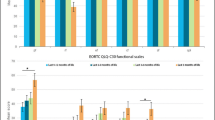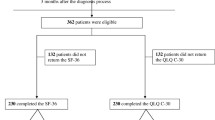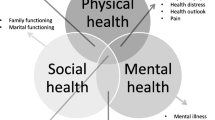Abstract
Purpose
To determine whether patients’ self-reported quality-of-life (QOL) parameters could predict survival for patients with advanced gastric cancer (AGC) treated with first-line chemotherapy, we performed this analysis based on the data obtained from 254 patients enrolled in three consecutive prospective randomized trials at a single institution.
Methods
Consenting patients with AGC received first-line chemotherapy as specified in the protocols. QOL was assessed at baseline using the European Organisation for Research and Treatment of Cancer (EORTC) QLQ-C30 questionnaires. Baseline univariate and multivariate analyses were performed on the QOL data and the recognized clinical predictors for survival.
Results
Of 254 patients, 164 completed the QOL questionnaire at baseline. All patients received fluorouracil-containing first-line chemotherapy for AGC. With 88% observed deaths and a reported median survival of 9.5 months [95% confidence interval (CI) 8.8–10.2 months], there were no significant differences in survival between patients with or without QOL data. The final Cox multivariate model revealed four prognostic factors: age [hazard ratio (HR) 2.08, 95% CI 1.32–3.33, P = 0.002], bone metastasis (HR 2.70, 95% CI 1.30–5.56, P = 0.008), hemoglobin (HR 0.58, 95% CI 0.37–0.92, P = 0.020), and social functioning (HR 0.40, 95% CI 0.23–0.64, P = 0.001). When adjusting for clinical parameters, social functioning was an independently significant prognostic factor for longer survival.
Conclusion
Baseline social functioning, along with age, presence of bone metastasis, and baseline hemoglobin level, independently predicts survival of AGC patients treated with first-line chemotherapy. QOL assessment should be routinely included to provide useful prognostic information concerning AGC patients.

Similar content being viewed by others
References
Bae, J. M., Won, Y. J., Jung, K. W., & Park, J. G. (2002). Annual report of the Korean Central Cancer Registry Program 2000. Cancer Research and Treatment, 34, 77–83.
Glimelius, B., Ekstrom, K., Hoffman, K., et al. (1997). Randomized comparison between chemotherapy plus best supportive care with best supportive care in advanced gastric cancer. Annals of Oncology, 8, 163–168.
Pyrhonen, S., Kuitunen, T., Nyandoto, P., & Kouri, M. (1995). Randomised comparison of fluorouracil, epidoxorubicin and methotrexate (FEMTX) plus supportive care with supportive care alone in patients with non-resectable gastric cancer. British Journal of Cancer, 71, 587–591.
Bamias, A., & Pavlidis, N. (1998). Systemic chemotherapy in gastric cancer: Where do we stand today? Oncologist, 3, 171–177.
Van Cutsem, E. (2004). The treatment of advanced gastric cancer: New findings on the activity of the taxanes. Oncologist, 9 Suppl 2, 9–15.
Chau, I., Norman, A. R., Cunningham, D., et al. (2004). Multivariate prognostic factor analysis in locally advanced and metastatic esophago-gastric cancer–pooled analysis from three multicenter, randomized, controlled trials using individual patient data. Journal of Clinical Oncology, 22, 2395–2403.
Lee, J., Lim, T., Uhm, J., et al. (2007). Prognostic model to predict survival following first-line chemotherapy in patients with metastatic gastric adenocarcinoma. Annals of Oncology, 18, 886–891.
Stephens, R. J., Hopwood, P., & Girling, D. J. (1999). Defining and analysing symptom palliation in cancer clinical trials: A deceptively difficult exercise. British Journal of Cancer, 79, 538–544.
Dancey, J., Shepherd, F. A., Gralla, R. J., & Kim, Y. S. (2004). Quality of life assessment of second-line docetaxel versus best supportive care in patients with non-small-cell lung cancer previously treated with platinum-based chemotherapy: Results of a prospective, randomized phase III trial. Lung Cancer, 43, 183–194.
Maione, P., Perrone, F., Gallo, C., et al. (2005). Pretreatment quality of life and functional status assessment significantly predict survival of elderly patients with advanced non-small-cell lung cancer receiving chemotherapy: A prognostic analysis of the multicenter Italian lung cancer in the elderly study. Journal of Clinical Oncology, 23, 6865–6872.
Kramer, J. A., Curran, D., Piccart, M., et al. (2000). Identification and interpretation of clinical and quality of life prognostic factors for survival and response to treatment in first-line chemotherapy in advanced breast cancer. European Journal of Cancer, 36, 1498–1506.
Blazeby, J. M., Brookes, S. T., & Alderson, D. (2001). The prognostic value of quality of life scores during treatment for oesophageal cancer. Gut, 49, 227–230.
Dancey, J., Zee, B., Osoba, D., et al. (1997). Quality of life scores: An independent prognostic variable in a general population of cancer patients receiving chemotherapy. The National Cancer Institute of Canada Clinical Trials Group. Quality of Life Research, 6, 151–158.
Park, S. H., Nam, E., Bang, S. M., et al. (2008). A randomized trial of anemia correction with two different hemoglobin targets in the first-line chemotherapy of advanced gastric cancer. Cancer Chemotherapy Pharmacology (in press). doi:10.1007/s00280-007-0561-1.
Park, S. H., Lee, W. K., Chung, M., et al. (2006). Paclitaxel versus docetaxel for advanced gastric cancer: A randomized phase II trial in combination with infusional 5-fluorouracil. Anticancer Drugs, 17, 225–229.
Park, S. H., Nam, E., Park, J., et al. (2008). Randomized phase II study of irinotecan, leucovorin and 5-fluorouracil (ILF) versus cisplatin plus ILF (PILF) combination chemotherapy for advanced gastric cancer. Annals of Oncology (in press). doi:10.1093/annonc/mdm502.
Aaronson, N. K., Ahmedzai, S., Bergman, B., et al. (1993). The European organization for research and treatment of cancer QLQ-C30: A quality-of-life instrument for use in international clinical trials in oncology. Journal of the National Cancer Institute, 85, 365–376.
Yun, Y. H., Park, Y. S., Lee, E. S., et al. (2004). Validation of the Korean version of the EORTC QLQ-C30. Quality of Life Research, 13, 863–868.
Fayers, P. M., Aaronson, N. K., Bjordal, K., et al. (2001). EORTC QLQ-C30 scoring manual (3rd ed.). Brussels, Belgium: EORTC Quality of Life Group 2001.
Park, S. H., Lee, J., Lee, S. H., et al. (2006). Anemia is the strongest prognostic factor for outcomes of 5-fluorouracil-based first-line chemotherapy in patients with advanced gastric cancer. Cancer Chemotherapy and Pharmacology, 57, 91–96.
Coates, A., Gebski, V., Signorini, D., et al. (1992). Prognostic value of quality-of-life scores during chemotherapy for advanced breast cancer. Australian New Zealand Breast Cancer Trials Group. Journal of Clinical Oncology, 10, 1833–1838.
Coates, A., Porzsolt, F., & Osoba, D. (1997). Quality of life in oncology practice: Prognostic value of EORTC QLQ-C30 scores in patients with advanced malignancy. European Journal of Cancer, 33, 1025–1030.
Acknowledgement
This work was supported in part by an unrestricted grant from the Gachon University of Medicine and Science Research Fund, Incheon, Korea.
Author information
Authors and Affiliations
Corresponding author
Rights and permissions
About this article
Cite this article
Park, S.H., Cho, M.S., Kim, Y.S. et al. Self-reported health-related quality of life predicts survival for patients with advanced gastric cancer treated with first-line chemotherapy. Qual Life Res 17, 207–214 (2008). https://doi.org/10.1007/s11136-008-9307-8
Received:
Accepted:
Published:
Issue Date:
DOI: https://doi.org/10.1007/s11136-008-9307-8




